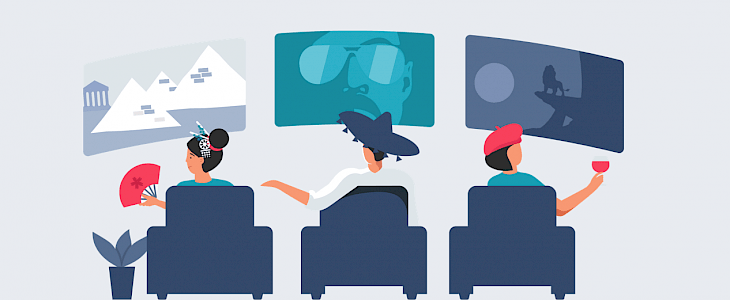
Geo-blocking is a scenario that impacts everyone due to licensing and copyright difficulties, government policies, and other considerations. The message-"The content is not accessible in your country"- can appear out of nowhere. So, what exactly do you do? How do you get around geo-blocking? In this piece, I'll go through everything in detail.
What is Geoblocking?
Geoblocking tracks your Internet Protocol (IP) address. More than 60 countries use state-sponsored censorship in some form. In two bullet points, the primary reasons for geo-blocking can be summarized: Issues with copyright and licensing.
Censorship is also increasing in many democratic countries. Using specialized software, it is possible to track your online behavior effortlessly.
Geo-blocking also applies when traveling. If you're in Iran, for example, you can't use Airbnb (one of the most popular trip and accommodation planning apps).
How to Bypass Geoblocking?
Use a VPN
A VPN is the most effective solution to circumvent Geoblocking securely and privately. It masks your true IP address and replaces it with one that is based in another country.
Obtaining a virtual private network (VPN) is simple and usually inexpensive. The majority of VPNs are compatible with iOS, Android, macOS, and Windows. Surfshark, for example, makes the VPN available for Chrome and Firefox, Linux, FireTV, AppleTV (+ other smart TVs), Xbox, and Playstation.
What is the best way to get started with a VPN?
- Go to the VPN provider's website or app store on your device.
- Install the app.
- Follow the simple installation instructions to set up a VPN.
- Create an account or log in if you already have one.
- Select a nation (server) that will allow you to visit the website you're looking for.
- Connect to the server and make use of the unrestricted internet!
Proxy Servers
A proxy server behaves like a sort of "middleman" between you and the website you're trying to access (or a separate computer). A Proxy server, like any other device that connects to the internet, has an IP address. When you use a proxy to connect to the internet, it gives you a different IP address before forwarding you to the website you want to visit.
When it comes to getting around website blocks, proxies can be useful, but they aren't as safe or effective as a VPN. A good VPN encrypts all the data that passes through your device. On the other hand, a proxy only functions inside the confines of a single website or application.
There are a plethora of free proxy services available online, but free rarely equals good, especially when it comes to privacy, security, and advanced encryption techniques.
Tor Browser
Another technique to get around geo-restrictions is to use Tor. It functions in a similar way as any other browser, such as Chrome or Safari. You can access all standard websites as well as special onion sites that are only accessible through the Tor network.
The New York Times, for example, has a.onion domain, which means that you may read the newspaper anonymously using Tor.
Tor, on the other hand, does not provide the same level of protection as a VPN. Your ISP would be able to detect that you're using Tor, and due to Tor's negative reputation, they may be suspicious of your online activities. Tor, unlike a VPN, is also exceedingly slow due to its design.
Smart DNS
A Domain Name System (DNS) makes domain names intelligible, such as Facebook. Imagine having to put in a big string of digits instead of a brief, eight-letter name every time you wanted to use Facebook. It's thanks to DNS that it's been made easier.
When you use Smart DNS or DNS changers (also known as DNS resolvers), they switch your device's DNS servers from local to DNS servers in another country.
If a website employs DNS level blocks to limit access to people from specific countries, Smart DNS or a DNS changer will suffice.
However, altering DNS for unblocking regionally restricted content has a number of disadvantages. It doesn't change your IP address, encrypts your data, or unlocks all of your files. You'll be much better off using a VPN because it provides far more functionality and security.





